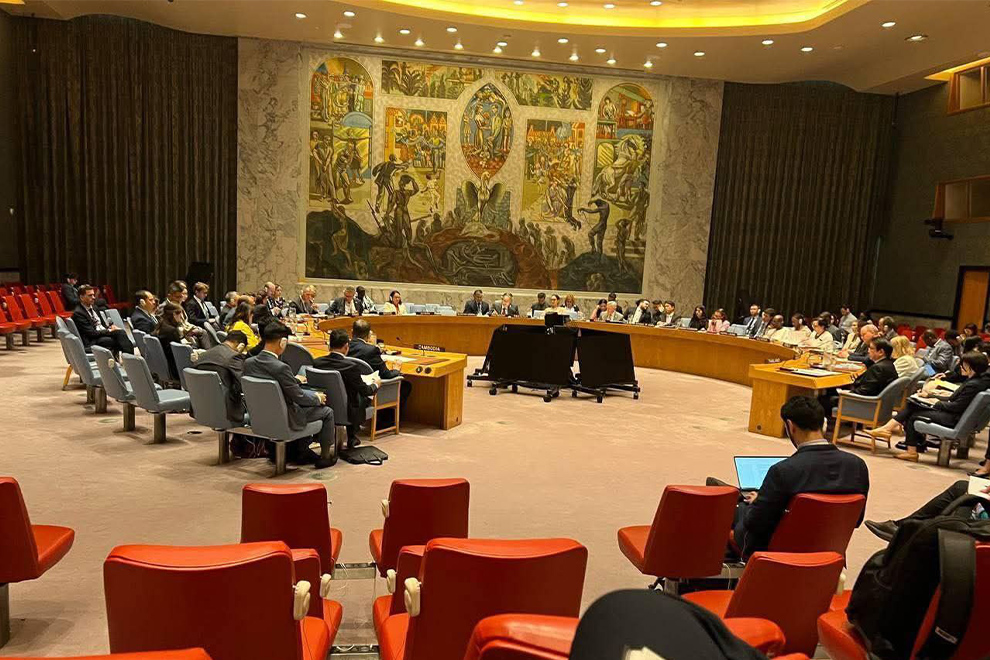 Photos from the Security Council’s closed-door session, begun at 2am Cambodian time, have circulated online. Supplied
Photos from the Security Council’s closed-door session, begun at 2am Cambodian time, have circulated online. Supplied
In an urgent appeal before the UN Security Council (UNSC) on July 25 in New York, Cambodia called for immediate international attention and intervention in response to escalating military aggression by Thailand along their shared border.
The Cambodian government condemned the unprovoked attacks on its territory, which have not only caused civilian casualties but also endangered cultural heritage sites, all while threatening regional peace and stability.
Chhea Keo, ambassador and permanent representative of the Kingdom of Cambodia to the UN, presented a compelling statement to the UNSC, urging immediate action under the UN’s mandate to uphold international peace and security.
“This blatant violation of Cambodia’s sovereignty and territorial integrity demands immediate action,” Keo declared, calling for an unconditional ceasefire, a halt to military escalation and a peaceful resolution to the longstanding Cambodia-Thailand border dispute.
He specifically asked the UNSC to send a clear message to Thailand, demanding the cessation of military activities and respect for Cambodia’s sovereignty.
The plea highlighted that the conflict posed a serious risk to both Cambodia and the broader Southeast Asian region, emphasising the critical role of the UN in preventing further violence and instability.
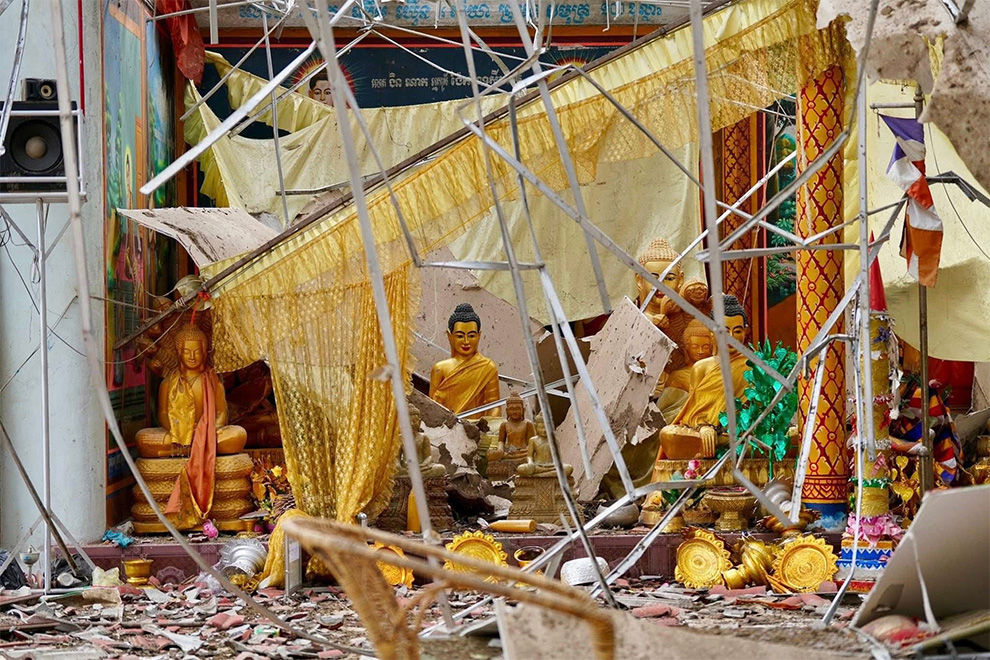
A bomb from a Thai F-16 struck the Ta Mone Sen Chey Pagoda, killing an abbot. Supplied
Thai aggression on Cambodian soil
The Cambodian government’s statement provided a detailed account of the events leading to the conflict.
On the morning of July 24, Thai military forces launched a deliberate attack on multiple Cambodian positions, specifically targeting culturally significant sites such as the Ta Mone Thom Temple, Ta Krabey Temple, Preah Vihear Temple, Keo Sekha Kirisvarak Pagoda and the Mom Bei area in Cambodia’s Preah Vihear and Oddar Meanchey provinces.
The attacks not only caused casualties but also caused significant damage to these revered temples, which are part of Cambodia’s rich cultural and historical heritage.
Keo emphasised the use of advanced military technology, such as F-16 fighter jets, tanks and cluster munitions, by Thai forces in these attacks.
“The Thai armed forces have expanded their military operation preparedness, by declaring emergency law in the provinces of Chanthabori and Trat, while Cambodia has made no military deployments or movements in the adjacent areas on the Cambodian side,” Keo stated.
“This is clearly not self-defence, as claimed by Thailand,” he added.
From a preliminary report, Cambodia has suffered severe damage from Thai military aggression. On July 24, an bomb dropped from an F-16 struck the Tamoan Sen Chey Pagoda, killing an abbot.
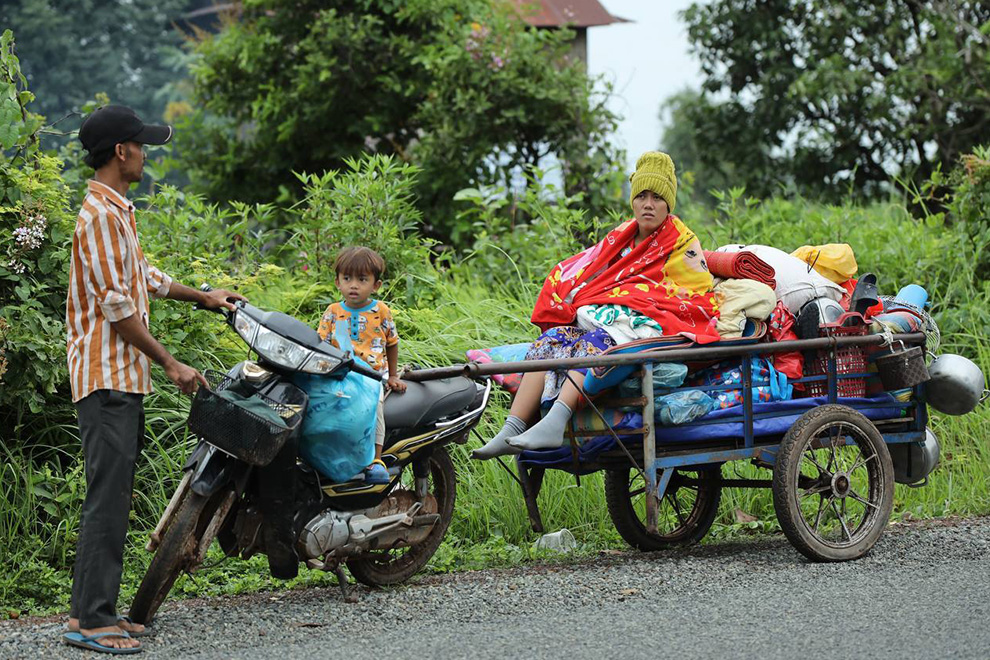
More than 37 thousand residents have been evacuated from danger zones in the provinces of Oddar Meanchey, Preah Vihear and Banteay Meanchey. Supplied
Cultural heritage in peril
Among the most distressing aspects of Thailand’s military actions, Cambodia pointed to the deliberate destruction of its cultural heritage.
The Preah Vihear Temple, a UNESCO World Heritage Site, was severely damaged during the airstrikes.
This destruction is seen as a violation of the Hague Convention of 1954, which seeks to protect cultural property during times of armed conflict.
The targeted cultural sites are not only symbols of Cambodia’s rich history but also serve as important spiritual and national landmarks.
“The following day, F-16 jets conducted multiple bombing raids, including on Ta Krabey Temple and Keo Sikhakirisvara Pagoda, just 300 metres from Preah Vihear Temple,” noted Keo.
“As far as human casualties, as of now we have 5 deaths and 21 injured on the military; and on the civilian side there are 8 deaths and 50 injured,” he added.
He also stated that more than 37 thousand residents have been evacuated from the danger zones in the provinces of Oddar Meanchey, Preah Vihear and Banteay Meanchey.
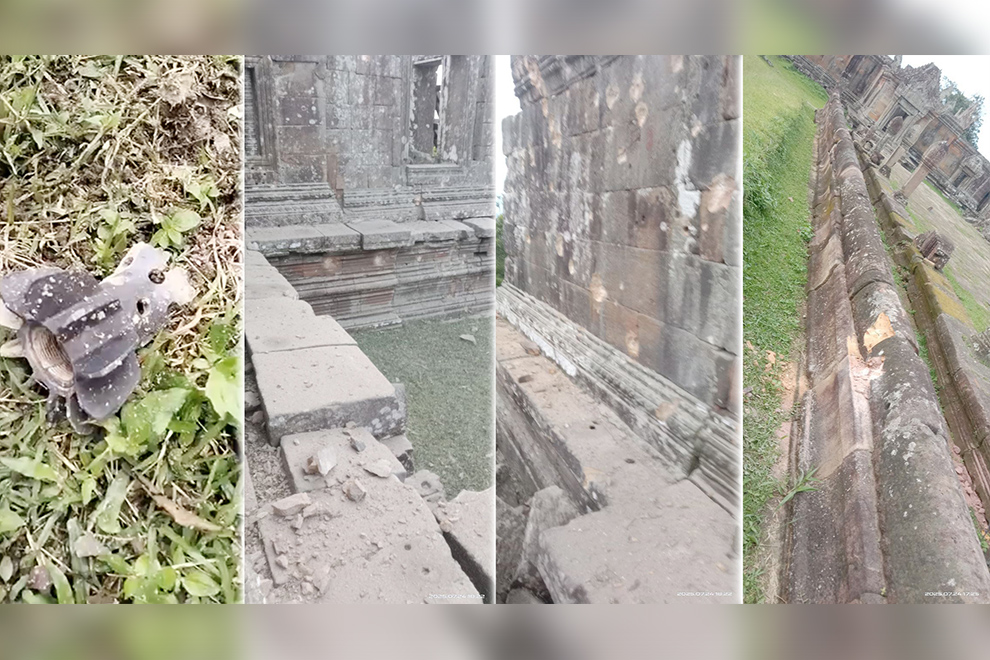
Shells and traces of destruction by Thai troops at the Preah Vihear Temple, a World Heritage Site. Supplied
Seeking justice through the ICJ
In an effort to resolve the conflict through peaceful means, Cambodia formally called for the dispute to be referred to the International Court of Justice (ICJ).
Cambodia has already expressed its intent to seek the ICJ’s adjudication over four key disputed areas: The Ta Mone Touch, Ta Mone Thom and Krabey temples, and the Mom Bei area.
This legal path, Cambodia insists, is the most appropriate means of resolving the territorial disagreement in accordance with international law.
“Cambodia upholds international law and the UN Charter, notably Chapter VI, on the Peaceful Settlement of Disputes,” said Keo.
He also noted how the Kingdom’s history has shaped its world view. Once a war-torn country, Cambodia does not seek war and always places the highest priority on peace.
“We remain unwavering in our commitment to peace, dialogue, and the principles of multilateralism; and as a small state, we entirely depend on a rules-based international order to safeguard our sovereignty and territorial integrity,” he stated.
“War cannot end war,” he said, referencing Cambodia’s painful history of conflict and its eventual reconciliation.
Cambodia’s request for the ICJ’s involvement is part of a broader strategy to ensure a rules-based, peaceful resolution that respects the sovereignty of both nations.
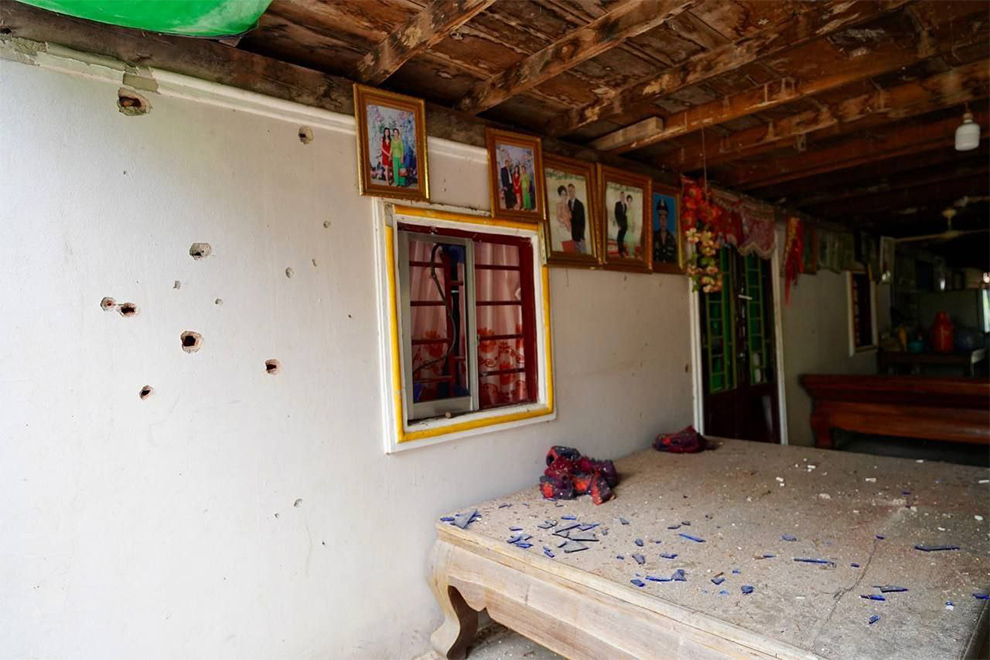
The homes of residents of O Pok and Kok Prasat villages, in Oddar Meanchey province, were damaged by Thai artillery shelling on July 25. Supplied
A call for regional stability
The statement also underscored the broader implications of the conflict for Southeast Asia.
Keo stressed that the dispute was not only a threat to Cambodia’s sovereignty but also posed a significant risk to the peace and stability of the region.
In his address, he urged the international community to support Cambodia’s legal efforts and called for a commitment to peace through dialogue, not force.
“We seek peace, not war,” he reiterated, highlighting Cambodia’s dedication to multilateralism and its reliance on the international order to safeguard its territorial integrity.
As tensions escalate, Cambodia’s leadership is firmly positioning itself as a proponent of dialogue and peaceful conflict resolution.
Keo condemned what he described as military aggression by Thailand’s armed forces, saying it blatantly violated the core principles of non-aggression and peaceful dispute resolution, outlined in both the UN Charter and the ASEAN Charter.
He emphasised that such hostile actions defy international law and undermine the spirit of good neighbourliness and mutual respect essential to regional cooperation and peace.
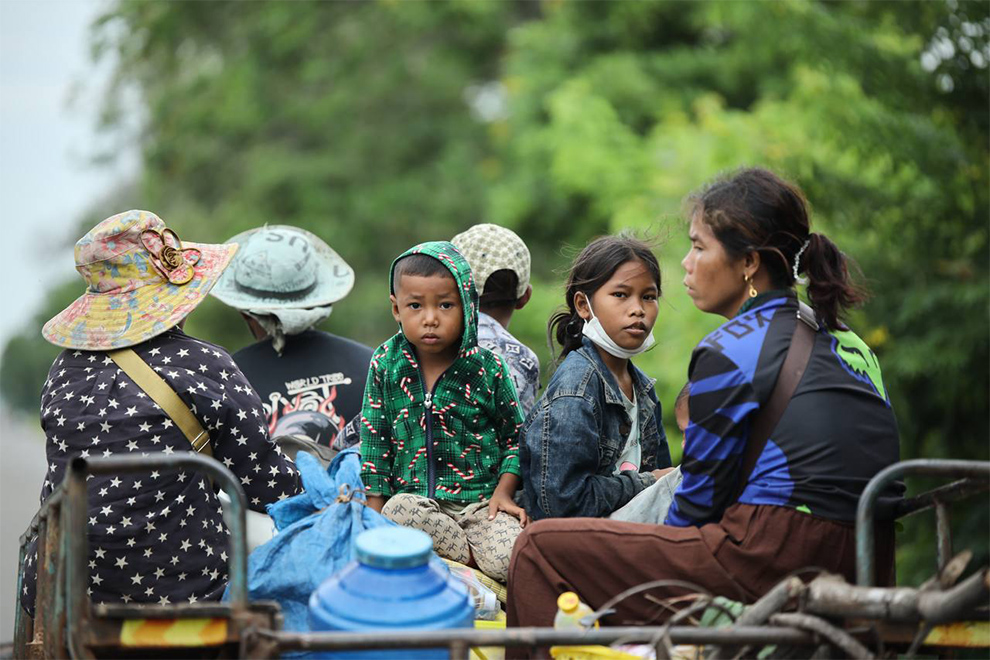
More than 37 thousand residents have been evacuated from Oddar Meanchey, Preah Vihear and Banteay Meanchey provinces. Supplied
Thailand’s repeated violations
The Cambodian statement also pointed to a long history of border disputes and unilateral actions by Thailand, including the use of an invalid map to justify its territorial claims.
Cambodia accused Thailand of violating a 2000 memorandum of understanding (MoU) regarding border demarcation and claimed that Thai actions, such as closing the Ta Mone Thom Temple to Cambodian citizens, amounted to de facto annexation of Cambodian territory.
“Thailand has continued to use a map that it has unilaterally drawn, lacking any legal basis and flagrantly disregarding its commitment under the memorandum of understanding on the survey and demarcation of land boundaries signed between the two countries in 2000,” Keo said.
These aggressive actions, Cambodia contended, are part of a larger pattern of violations that have been exacerbated by the current military escalation.
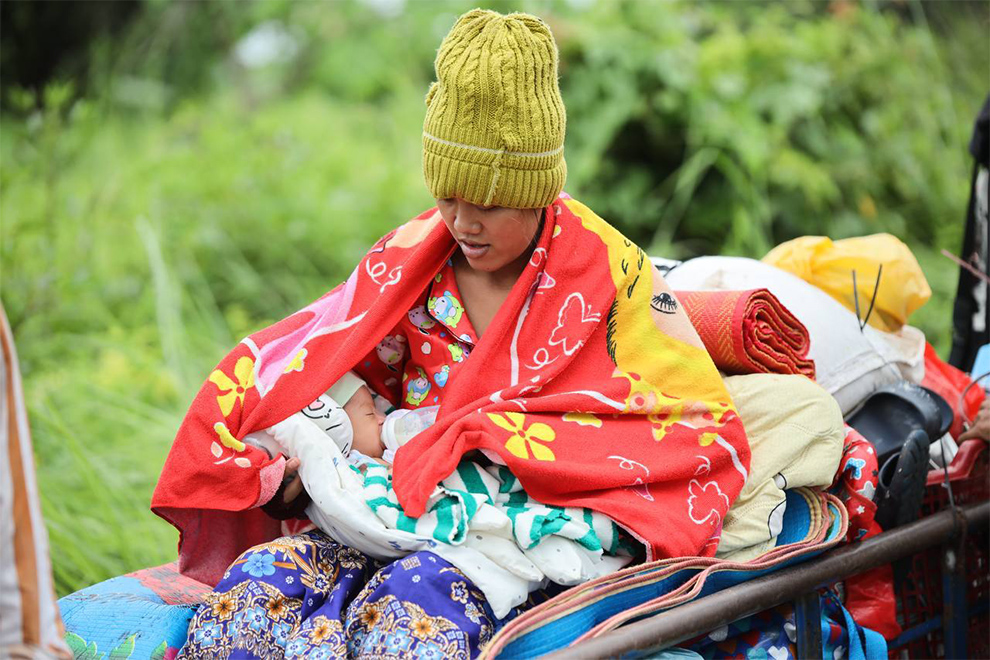
A united call for peace
Ambassador Keo concluded his statement by reiterating Cambodia’s commitment to working with Thailand toward a peaceful resolution through the ICJ.
He urged the UNSC to take immediate action to facilitate a ceasefire and dispatch a fact-finding mission to the affected border areas.
Cambodia, he stated, would continue to pursue peace and justice in accordance with international law, while also standing firm in its defence of national sovereignty.
“In order to prevent further armed conflict that could endanger regional security and stability, and to preserve lasting peace between the two countries, Cambodia has chosen to refer the four disputed areas to the ICJ and hereby declares in advance its acceptance of all ICJ rulings,” said Keo.
He stated that this represents the most just and appropriate means of resolving the dispute in accordance with international law and delivering fair and reliable justice for the peoples of both countries.


